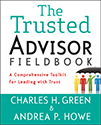This post is part of our Weekly Tips series.
- Trust is personal
- Trust is paradoxical
- Trust is positively correlated to risk
When we say trust is paradoxical, what we mean is that it appears to defy logic. The best way to sell, it turns out, is to stop trying to sell. The best way to influence is to stop trying to influence. The best way to gain credibility is to admit what you do not know.
The paradoxical qualities of trust arise because trust is a higher-level relationship. The trust-creating thing to do is often the opposite of what your baser passions tell you to do. Fight or flight, self-preservation, the instinct to win—these are not the motives that drive trust. The ultimate paradox is that, by rising above such instincts, you end up getting better results than if you had striven for them in the first place.1
1 Excerpted from The Trusted Advisor Fieldbook: A Comprehensive Toolkit for Leading with Trust
Bonus: Making it Real
This week, examine the paradox of trust-building more closely. How?
Bring to mind at least three instances when you thought a particular action would break trust and instead that action built trust. For example, you may have spoken a difficult truth and found that the relationship grew closer as a result. Perhaps you heard a colleague refer a client to a competitor, only to learn that this solidified the client’s loyalty to your organization. Examine these instances carefully. Why was trust created, rather than eroded?
Learn More

- Learn more about the paradox of selling from our partners at Trusted Advisor Associates.
- Read about the fundamental truths of leading with trust in Chapter 1 of The Trusted Advisor Fieldbook: A Comprehensive Toolkit for Leading with Trust.
Andrea Howe
Latest posts by Andrea Howe (see all)
- Role models for healthy candor - May 27, 2025
- A small gesture (and related risk) with big trust impact (Part II) - April 1, 2025
- A small gesture (and related risk) with big trust impact (Part I) - March 3, 2025

The paradox is not something I’ve ever been completely conscious of, yet it registers as true in my experience. I think some of those “baser instincts” might be actually learned habits or ways of proceeding that can be unlearned.
Another great one Andrea.
Thanks, Dave, and I do believe you are correct about baser instincts being more like learned habits. Great point.